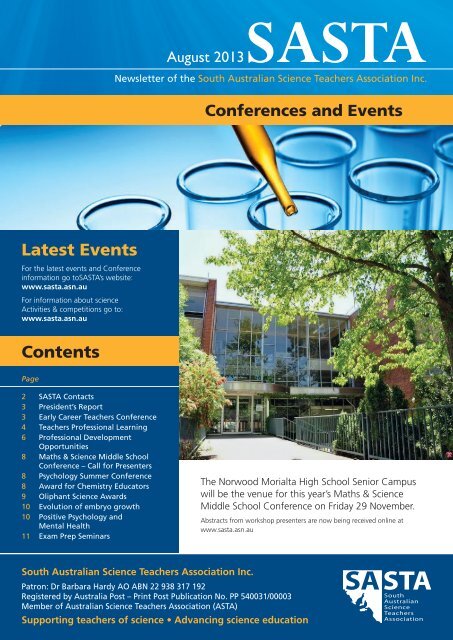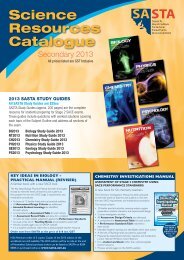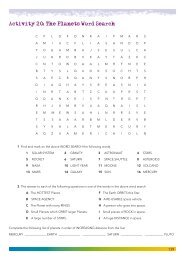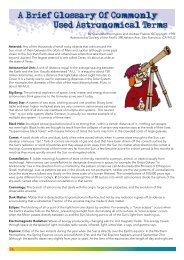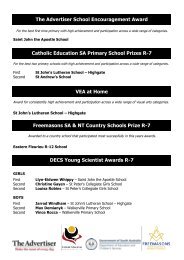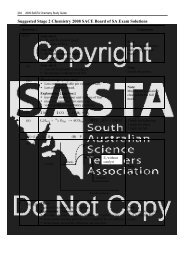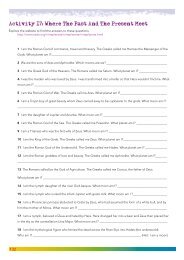SASTA Newsletter_August 13 (3.9 mb, PDF) - South Australian ...
SASTA Newsletter_August 13 (3.9 mb, PDF) - South Australian ...
SASTA Newsletter_August 13 (3.9 mb, PDF) - South Australian ...
Create successful ePaper yourself
Turn your PDF publications into a flip-book with our unique Google optimized e-Paper software.
<strong>August</strong> 20<strong>13</strong><br />
<strong>Newsletter</strong> of the <strong>South</strong> <strong>Australian</strong> Science Teachers Association Inc.<br />
Conferences and Events<br />
Latest Events<br />
For the latest events and Conference<br />
information go to<strong>SASTA</strong>’s website:<br />
www.sasta.asn.au<br />
For information about science<br />
Activities & competitions go to:<br />
www.sasta.asn.au<br />
Contents<br />
Page<br />
2 <strong>SASTA</strong> Contacts<br />
3 President’s Report<br />
3 Early Career Teachers Conference<br />
4 Teachers Professional Learning<br />
6 Professional Development<br />
Opportunities<br />
8 Maths & Science Middle School<br />
Conference – Call for Presenters<br />
8 Psychology Summer Conference<br />
8 Award for Chemistry Educators<br />
9 Oliphant Science Awards<br />
10 Evolution of e<strong>mb</strong>ryo growth<br />
10 Positive Psychology and<br />
Mental Health<br />
11 Exam Prep Seminars<br />
The Norwood Morialta High School Senior Campus<br />
will be the venue for this year’s Maths & Science<br />
Middle School Conference on Friday 29 Nove<strong>mb</strong>er.<br />
Abstracts from workshop presenters are now being received online at<br />
www.sasta.asn.au<br />
<strong>South</strong> <strong>Australian</strong> Science Teachers Association Inc.<br />
Patron: Dr Barbara Hardy AO ABN 22 938 317 192<br />
Registered by Australia Post – Print Post Publication No. PP 540031/00003<br />
Me<strong>mb</strong>er of <strong>Australian</strong> Science Teachers Association (ASTA)<br />
Supporting teachers of science • Advancing science education
<strong>Newsletter</strong> of the <strong>South</strong> <strong>Australian</strong> Science Teachers Association Inc.<br />
20<strong>13</strong> <strong>SASTA</strong> Committee<br />
Patron of the <strong>South</strong> <strong>Australian</strong><br />
Science Teachers Association<br />
Dr Barbara Hardy AO<br />
<strong>SASTA</strong> Board<br />
Mark Divito (President)<br />
Karen Palu<strong>mb</strong>o (Vice President)<br />
Ian Maynard (Treasurer)<br />
Peter Donnelly<br />
John Glistak<br />
Chris Jordison<br />
Peter Turnbull<br />
Board Representatives<br />
Awards<br />
Chris Jordison<br />
CONASTA 63<br />
Peter Turnbull<br />
PD & Conferences<br />
Peter Donnelly<br />
Journal<br />
John Glistak<br />
Me<strong>mb</strong>ership<br />
Mark Divito<br />
Oliphant Science Awards<br />
Peter Turnbull<br />
ASTA Councillors<br />
Mark Divito<br />
Chris Jordison<br />
Honorary Life Me<strong>mb</strong>ers<br />
Doug Anders<br />
Tony Diercks<br />
Elma Gurney<br />
Bob Morton AM<br />
Ronne Page<br />
Mike Roach<br />
Lester Russell<br />
Peter Schodde OAM<br />
Jack Smith<br />
Ray Smith<br />
Alby Whitelaw<br />
Dr Jane Wright<br />
<strong>SASTA</strong> Office:<br />
Executive Officer:<br />
Greg Cole<br />
Office Manager:<br />
Rebecca van Schuilenburg<br />
Project Officer:<br />
Kate Dilger<br />
249 Henley Beach Road<br />
Torrensville SA 5031<br />
Phone: 08 8354 0006<br />
Fax: 08 8354 0008<br />
Email: office@sasta.asn.au<br />
URL: www.sasta.asn.au<br />
<strong>Newsletter</strong> copy<br />
deadlines 20<strong>13</strong><br />
(Advertising deadlines<br />
one week earlier)<br />
February - 1 February<br />
May - 3 May<br />
<strong>August</strong> - 2 <strong>August</strong><br />
Nove<strong>mb</strong>er - 1 Nove<strong>mb</strong>er<br />
Advertising<br />
Advertising rates & booking form online<br />
at www.sasta.asn.au<br />
Views expressed in this newsletter are not<br />
necessarily those of <strong>SASTA</strong> or the editors.<br />
Whilst every effort is made to be factual,<br />
no liability is accepted for the accuracy of<br />
information presented.<br />
© 20<strong>13</strong> <strong>SASTA</strong>. Reproduction of material<br />
contained herein is permitted provided its<br />
source is acknowledged. All contributions<br />
should be emailed to eo@sasta.asn.au<br />
Adhering to the following guidelines would be<br />
appreciated:<br />
Save as a Microsoft Word document<br />
Tables to be set up as text with one tab<br />
between columns and a return at the end of<br />
each row.<br />
For spelling please use the Macquarie Dictionary<br />
and where several alternative spellings are<br />
listed, use the first. The exception to this is<br />
when you are citing, referencing or quoting<br />
directly from a source which uses alternative<br />
spelling. Photographs should be high quality<br />
untouched digital photographs.<br />
2 <strong>SASTA</strong> • <strong>August</strong> 20<strong>13</strong>
<strong>August</strong> 20<strong>13</strong><br />
From the President<br />
During the last school holidays I<br />
attended CONASTA 62 (the national<br />
science teachers’ conference) at<br />
La Trobe University. The speakers<br />
and presenters were in my opinion<br />
excellent and I was particularly<br />
impressed by Barry Jones, maybe all<br />
the more because I can’t reme<strong>mb</strong>er<br />
having heard him speak before. Peter<br />
Turnbull and his organising committee<br />
are now working to finalise the<br />
speakers and presenters for CONASTA<br />
63 which will be held in Adelaide next July. This event only<br />
comes to <strong>South</strong> Australia every eight years and will be our main<br />
conference focus for 2014 and therefore we will not be holding<br />
our usual <strong>SASTA</strong> two day conference in April.<br />
TRB<br />
From this year on all teachers in <strong>South</strong> Australia wishing to renew<br />
their teaching registration for a further term, will be required<br />
to undertake 60 hours of professional learning within their 3<br />
year term of registration referenced to the <strong>Australian</strong> National<br />
Professional standards for teachers. <strong>SASTA</strong> is ensuring that all of<br />
the professional learning that we offer meets these requirements.<br />
Also if you book any workshop or conference online with our<br />
website, a record is kept on our database that you are able to<br />
access in 3 years’ time if you need to provide evidence to the<br />
Teachers Registration Board.<br />
Organic Water<br />
I notice with great interest, that in the last month, the ACCC has<br />
taken action to have manufacturers remove the word “organic”<br />
from 7 different brands of bottled water. Over the past 5 years<br />
I have been collecting different examples of bottled “organic”<br />
water for use in the science classroom as a discussion point for<br />
students. A government body has finally decided that there is no<br />
sensible reason for labelling bottled drinking water “organic”.<br />
I will now wait and see if the ACCC takes action against the<br />
shopping mall purveyors of water “magnetisers” and the selling<br />
of “magnetic water” as a panacea.<br />
Mark Divito<br />
President<br />
<strong>SASTA</strong> Early Career<br />
Teachers Conference<br />
Date: Monday 30th Septe<strong>mb</strong>er<br />
Time: 9.00am- 4.00pm<br />
Venue: Immanuel College, 32 Morphett Road, Novar Gardens<br />
Cost: Personal Me<strong>mb</strong>ers $115, Corporate Me<strong>mb</strong>ers $<strong>13</strong>5,<br />
Non-me<strong>mb</strong>ers $165<br />
Lunch and morning tea provided. Full program and registration<br />
online at www.sasta.asn.au<br />
<strong>SASTA</strong> is offering a full day of workshops for all teachers of<br />
Science from Reception to Year 12 who are in the first 3 years of<br />
teaching.<br />
All sessions will be interactive and provide fun learning<br />
opportunities as well as resources that will enrich and inform your<br />
science teaching. Five main sessions will run throughout the day<br />
each with a different focus:<br />
• The <strong>Australian</strong> Curriculum: Science – an overview of the<br />
curriculum, planning tools and strategies<br />
• Assessment – task design and implementation<br />
• Pedagogy – science investigations, inquiry learning,<br />
engaging students in science<br />
• Resources – ICT and other resources for the science<br />
classroom<br />
• Behaviour Management – successful classroom strategies<br />
In addition, there will be exciting science demonstrations and a<br />
chance to interact with the presenters.<br />
This hands-on interactive professional learning day will cater<br />
specifically for each level of schooling. Workshops will be offered<br />
concurrently at each session so participants can choose to attend<br />
those that are most relevant to their area of teaching: Early<br />
Years, Primary Years, Middle Years or Senior Years.<br />
National Professional Standards for Teachers:<br />
Teachers will receive a certificate of attendance that details the<br />
hours of professional learning and the Standards covered: 2.1,<br />
2.2, 3.2, 6.2, 7.4.<br />
<strong>SASTA</strong> • <strong>August</strong> 20<strong>13</strong> 3
<strong>Newsletter</strong> of the <strong>South</strong> <strong>Australian</strong> Science Teachers Association Inc.<br />
Teachers Professional Learning<br />
In Term 3 <strong>SASTA</strong> will offer the following professional learning opportunities:<br />
For Secondary/Middle school teachers:<br />
1. Working with the Achievement Standards:<br />
Assessment that drives learning in science.<br />
Date: Friday 23rd <strong>August</strong><br />
Time: 9.00 am - 3.00 pm<br />
Venue: Education Development Centre, Milner Street,<br />
Hindmarsh<br />
Cost: Personal Me<strong>mb</strong>ers $95, Corporate Me<strong>mb</strong>ers $120,<br />
Non-me<strong>mb</strong>ers $150<br />
Lunch and morning tea provided. Register at www.sasta.asn.au<br />
Viewed through the lens of assessment, what has ACARA given<br />
us so far?<br />
• Content<br />
• Achievement Standards<br />
• Exemplars of three different levels of achievement<br />
What ACARA has not done is to describe the quality of<br />
achievement.<br />
In this workshop we will explore assessment for, as and of<br />
learning. Will look at assessment design and use exemplars to<br />
develop skills in designing assessment tasks that drive learning.<br />
We will also explore how to use the Achievement Standards<br />
to make on-balance judgments about the quality of learning<br />
demonstrated by the students. We will describe this achievement<br />
across an A-E continuum using an assessment rubric and look<br />
at how such an assessment tool can be used to assist teachers to<br />
plan rich units of work that allow for access as well as excellence.<br />
The Workshop will cover the following:<br />
• Assessment Principles, Purposes and Features<br />
• Assessment in The <strong>Australian</strong> Curriculum<br />
• Achievement Standards<br />
• Assessment Literacy<br />
• An Assessment Tool<br />
• Quality Assessment tasks<br />
• Reporting<br />
2. Inquiry- based learning; how it works in the<br />
science classroom.<br />
Date: Friday 1st Nove<strong>mb</strong>er<br />
Time: 9.00 am - 3.00 pm<br />
Venue: Education Development Centre, Milner Street,<br />
Hindmarsh<br />
Cost: Personal Me<strong>mb</strong>ers $95, Corporate Me<strong>mb</strong>ers $120,<br />
Non me<strong>mb</strong>ers $150<br />
Lunch and morning tea provided. Register at www.sasta.asn.au<br />
The <strong>Australian</strong> Curriculum: Science emphasises inquiry-based<br />
teaching and learning. Scientific inquiry promotes critical and<br />
creative thinking by encouraging flexibility and open-mindedness<br />
as students speculate about their observations of the world. In<br />
an inquiry classroom, students are able to challenge themselves<br />
to identify questions and draw evidence-based conclusions using<br />
scientific methods.<br />
In this workshop teachers will investigate the process and<br />
practicalities of inquiry learning in the Science classroom.<br />
They will engage in hands-on activities that will inform their<br />
understanding of the types of inquiry and how to implement<br />
them in their teaching program.<br />
The Workshop will cover the following:<br />
• What is Science? How do scientists work?<br />
• What is Inquiry Based Teaching?<br />
• Forms of Inquiry<br />
• Practical Representation/The 5Es Model<br />
• Strategies for Inquiry Based Teaching<br />
• Adapting materials<br />
• Leading change<br />
Who should attend: Secondary/Middle school teachers<br />
Who should attend: Secondary/Middle school teachers<br />
4 <strong>SASTA</strong> • <strong>August</strong> 20<strong>13</strong>
<strong>August</strong> 20<strong>13</strong><br />
For Primary Years Teachers:<br />
Year 7 Science: Content, Competence and Confidence:<br />
1. Biological Science<br />
Date: Friday 2nd <strong>August</strong><br />
Time: 9.00am -3.00pm<br />
Venue: Education Development Centre, Milner Street,<br />
Hindmarsh<br />
Cost: Personal Me<strong>mb</strong>ers $85, Corporate Me<strong>mb</strong>ers $105,<br />
Non-me<strong>mb</strong>ers $<strong>13</strong>0<br />
Lunch and morning tea provided. Register at www.sasta.asn.au<br />
2. Earth and Space Science<br />
Date: Friday 30th <strong>August</strong><br />
Time: 9.00am -3.00pm<br />
Venue: Education Development Centre, Milner Street,<br />
Hindmarsh<br />
Cost: Personal Me<strong>mb</strong>ers $85, Corporate Me<strong>mb</strong>ers $105,<br />
Non-me<strong>mb</strong>ers $<strong>13</strong>0<br />
Lunch and morning tea provided. Register at www.sasta.asn.au<br />
This workshop will support teachers to further develop their<br />
current understanding of the Science Understanding Strand:<br />
Earth and Space Science<br />
The workshop aims to build teacher knowledge and conceptual<br />
understandings while participants are actively engaged in science<br />
investigations using the Science Inquiry Skills. The workshop will<br />
use an inquiry approach to the learning of science, providing<br />
teachers with the confidence and resources to implement the<br />
requirements of the <strong>Australian</strong> Curriculum in their classrooms.<br />
Structure of Workshops<br />
• Big Science Ideas – mapping of the concepts explored in the<br />
sub strand, what is your part in the story?<br />
• Building Understanding – hands- on investigations<br />
that allow participants to explore the concepts and build<br />
understanding using explicit and modelled pedagogy.<br />
• Unit Development – opportunity to develop rich science<br />
programs that e<strong>mb</strong>ed the Capabilities of Literacy and Critical<br />
and Creative Thinking, the Science Inquiry Skills and that are<br />
framed by the Science as a Human Endeavour sub strand.<br />
Science Investigations in a<br />
Primary Classroom<br />
Date: Friday <strong>13</strong>th Septe<strong>mb</strong>er<br />
Time: 9.00 am - 3.00 pm<br />
Venue: Education Development Centre, Milner Street,<br />
Hindmarsh<br />
Cost: Personal Me<strong>mb</strong>ers $95, Corporate Me<strong>mb</strong>ers $120,<br />
Non-me<strong>mb</strong>ers $150<br />
Lunch and morning tea provided. Register at www.sasta.asn.au<br />
Children need opportunities to develop practical and inquiry skills<br />
in order to engage with the world in a scientific way and to make<br />
sense of what they are learning Hands-on investigations promote<br />
curiosity and engagement and provide opportunities for the type<br />
of discussion and questioning which develop understanding.<br />
This workshop will look at science investigations in action.<br />
Teachers will be led through the elements of a scientific<br />
investigation by:<br />
• Posing questions that are scientifically investigatable<br />
• Giving priority to evidence - gathering scientific data by<br />
recording observations and making measurements.<br />
• Formulating explanations from evidence to address the<br />
question.<br />
• Evaluating their explanations in light of scientific<br />
understanding.<br />
• Communicating and justifying their proposed explanations.<br />
Teachers will develop an understanding of how to use an<br />
investigation planner and implement the elements of scientific<br />
investigation in their classrooms.<br />
Who should attend: Primary Years teachers<br />
Please Note:<br />
Although this course is not designed specifically for teachers who<br />
have used Primary Connections, these workshops will provide<br />
a natural progression to those units of work and continue to<br />
deepen science understanding.<br />
Who should attend: Year 6/7 teachers or specialist<br />
science teachers<br />
<strong>SASTA</strong> • <strong>August</strong> 20<strong>13</strong> 5
<strong>Newsletter</strong> of the <strong>South</strong> <strong>Australian</strong> Science Teachers Association Inc.<br />
Professional Development Opportunities<br />
CONASTA 62 presenter, Nicolette Hilton, shared some inspiring<br />
Professional Development opportunities for primary and<br />
secondary school Science teachers, including specific information<br />
on applying for Churchill Fellowships.<br />
Nicolette Hilton is a senior school educator and TESEP (Teacher<br />
Earth Sciences Education Programme) presenter with 7 years<br />
teaching experience who has worked with NASA to develop<br />
learning materials and travelled across the USA as a Churchill<br />
Fellow seeking quality teaching resources and information on<br />
current research into Science education for <strong>Australian</strong> teachers.<br />
Spaceward Bound<br />
• NASA expeditions to Mars Analogues – environments that are<br />
comparable to those on Mars<br />
• Assist NASA Scientists – various projects<br />
• 2014 – Arkaroola <strong>South</strong> Australia<br />
• Annually – Mojave Desert CA, USA<br />
For Information…<br />
• Mars Society of Australia: http://marssociety.org.au/<br />
• Victorian Space Science Education Centre: http://www.vssec.<br />
vic.edu.au/<br />
• http://www.csupomona.edu/~rmogul/spacewardbound/<br />
Spaceward_Bound.html<br />
4.99<br />
%*<br />
p.a.<br />
Fixed for 1 year with no ongoing fees<br />
5.58<br />
%^<br />
p.a.<br />
Comparison rate<br />
TESEP<br />
• Teacher Earth Sciences Education Programme<br />
• Check dates and download brochures HERE!<br />
http://tesep.org.au/bigcalendar.html<br />
• Also on FACEBBOOK<br />
https://www.facebook.com/pages/Teacher-Earth-Science-<br />
Education-Program/155604677812356<br />
Science at the Shine Dome<br />
• Science Teaching Award from the <strong>Australian</strong> Academy of<br />
Science<br />
• Annual Awards Dinner<br />
• Symposium<br />
• Applications usually close in February each year<br />
• http://www.science.org.au/events/sats/sats20<strong>13</strong>/index.html<br />
Churchill Fellowship<br />
• 150 offered Australia wide<br />
• Average of 6 weeks travel<br />
• Up to $30,000 towards project<br />
• Open-ended<br />
Nicolette’s Project…<br />
• The Northern Districts Education Centre (Sydney) Churchill<br />
Fellowship to study innovative practices that improve<br />
engagement of students in science and promote a positive<br />
learning culture<br />
• http://churchilltrust/com.au/site_media/fellows/Hilton_<br />
Nicolette_2010.pdf<br />
How to Apply…<br />
• 2 Page application<br />
• Have influential people as referees<br />
• Be precise and passionate about your project<br />
• If at first you don’t succeed apply again<br />
• Application and more info…<br />
• http://churchilltrust.com.au/<br />
Nicolette’s Contact Details<br />
• nhilton@une.edu.au<br />
• nicolette.hilton@education.nsw.gov.au<br />
• Uralla Central School NSW<br />
• 0437 775 5780<br />
6 <strong>SASTA</strong> • <strong>August</strong> 20<strong>13</strong>
<strong>August</strong> 20<strong>13</strong><br />
Science at the Shine Dome<br />
TESEP<br />
Science at the Shine Dome<br />
TESEP<br />
Spaceward Bound<br />
Churchill Fellowship<br />
<strong>SASTA</strong> • <strong>August</strong> 20<strong>13</strong> 7
<strong>Newsletter</strong> of the <strong>South</strong> <strong>Australian</strong> Science Teachers Association Inc.<br />
Call for Workshop Presenters<br />
MASA – <strong>SASTA</strong> Conference<br />
Friday 29 Nove<strong>mb</strong>er 20<strong>13</strong><br />
A Science and Mathematics Conference for<br />
Middle Years (6-10)<br />
VENUE: NORWOOD MORIALTA HIGH SCHOOL (SENIOR CAMPUS)<br />
This conference will provide high quality professional<br />
development in addition to extensive networking opportunities.<br />
The <strong>South</strong> <strong>Australian</strong> Science Teachers Association and the<br />
Mathematical Association of <strong>South</strong> Australia are asking for<br />
expressions of interest from Middle Years educators to present<br />
practical workshop sessions at this conference.<br />
Presenting workshops for your colleagues is an excellent way to<br />
share best practice and develop a community of educators across<br />
the State. We encourage educators with all levels of experience<br />
to submit an abstract.<br />
All abstracts submitted should identify their target audience and<br />
detail the content to be covered.<br />
In accepting workshops the conference committee will be looking<br />
for a balance across levels of schooling and Science and/or<br />
Mathematics content.<br />
Possible Workshop Ideas:<br />
• Hands-on activities for middle school maths and/or science<br />
• Use of technologies in teaching and learning<br />
• Integrated units of work of Science and Mathematics<br />
• Middle years ‘Planning in Science and/or Mathematics’<br />
• Experiences in Planning integrated units of work<br />
• Ways of motivating students to consider maths & science in<br />
their future careers<br />
• On-line learning projects<br />
• Improving students confidence and experiences in Science<br />
and Mathematics<br />
Workshops should model the explicit pedagogies and<br />
content of the <strong>Australian</strong> curriculum<br />
Application to present a workshop: Persons interested in<br />
presenting a workshop at this conference should submit their<br />
abstract online at www.sasta.asn.au Workshop presenters<br />
will receive a $30 discount on their registration fee.<br />
Supported by:<br />
Call for Psychology<br />
Summer Conference<br />
Convenors<br />
<strong>SASTA</strong> would like to hear from experienced psychology teachers<br />
who may be interested in convening next year’s Psychology Summer<br />
Conference. Ideally we would like 2 convenors to collaborate and<br />
organise this popular event, which will probably be held at EDC.<br />
Me<strong>mb</strong>ers have been surveyed concerning their preferred date for<br />
the conference i.e. Friday 17 January or Friday 28 February but a<br />
decision has not yet been made. Expressions of interest detailing<br />
relevant experience can be emailed to eo@sasta.asn.au<br />
Previous conferences have provided an excellent opportunity<br />
for participants to share best practice and develop a community<br />
of educators across the State. We sincerely hope that this can<br />
continue but it will depend upon me<strong>mb</strong>er support.<br />
Secondary/Tertiary<br />
Award for Chemistry<br />
Educators 20<strong>13</strong><br />
Nominations for the D R Stranks Medal for Chemical Education<br />
Award for chemistry educators are called for in the areas of<br />
excellence in professional practice in chemical education and / or<br />
outstanding innovation in chemical education.<br />
This is an award presented by the SA Branch of the Royal<br />
<strong>Australian</strong> Chemical Institute.<br />
Nomination forms and rules regarding the award are available<br />
from Ian McMahon.<br />
Please contact ian.mcmahon@tsc.sa.edu.au to receive this<br />
information.<br />
Nominators please communicate intention to nominate by Monday<br />
26 <strong>August</strong> and submissions are due by Friday 7 Septe<strong>mb</strong>er.<br />
8 <strong>SASTA</strong> • <strong>August</strong> 20<strong>13</strong>
<strong>August</strong> 20<strong>13</strong><br />
OLIPHANT SCIENCE AWARDS<br />
<strong>South</strong> Australia’s Largest Student Science Competition<br />
Great Opportunities For Learning Through Science<br />
Entries are due soon<br />
Computer Programming<br />
& Robotics Judging<br />
Entries are judged at <strong>SASTA</strong> 249 Henley Beach Road,<br />
Torrensville on Saturday 17th <strong>August</strong>. Students will need<br />
to contact <strong>SASTA</strong> by Thursday 8 <strong>August</strong> to arrange an<br />
interview time with the judges.<br />
Crystal Investigations, Models &<br />
Inventions, Photography and Poster<br />
Entries are due on Friday 30th <strong>August</strong> at the Adelaide<br />
Festival Centre (Banquet Room) King William Road,<br />
Adelaide. Please deliver your school’s entries between<br />
9:00am – 5:00pm.<br />
Open day display<br />
Sunday 1 Septe<strong>mb</strong>er 12 noon – 4:00 pm at the<br />
Adelaide Festival Centre (Banquet Room) King William<br />
Road, Adelaide. The winning entries from Crystal<br />
Investigations, Science Writing, Scientific Inquiry,<br />
Games, Multimedia, Photograph and Posters are<br />
displayed as well as all the Models & Inventions.<br />
Come in and be inspired by the work of some of<br />
<strong>South</strong> Australia’s outstanding science students.<br />
Get involved!<br />
Find the 20<strong>13</strong> Oliphant Science Award information at:<br />
www.sasta.asn.au<br />
If you would like to help with the Judging or at the<br />
event send us an email at office@sasta.asn.au<br />
<strong>SASTA</strong> • <strong>August</strong> 20<strong>13</strong> 9
<strong>Newsletter</strong> of the <strong>South</strong> <strong>Australian</strong> Science Teachers Association Inc.<br />
Echidnas reveal evolution of e<strong>mb</strong>ryo growth<br />
One of the distinctive features of mammals is the prolonged<br />
development of the e<strong>mb</strong>ryo in the mother’s wo<strong>mb</strong>. Evolutionary<br />
biologists have long been fascinated by this massive energy<br />
investment by mammalian mothers, and because of this<br />
disproportionate energy input, believe that there is a rivalry in<br />
the e<strong>mb</strong>ryo between genes inherited from the father and the<br />
mother that control the e<strong>mb</strong>ryo’s energy supply. It is thought<br />
that the father’s genes may promote growth for the increased<br />
viability of his offspring, while the mother’s genes restrict<br />
growth to conserve her energy for future offspring. There are<br />
a nu<strong>mb</strong>er of mammalian genes whose activity depends on<br />
whether it is inherited from the father or the mother. This genetic<br />
phenomenon is called genomic imprinting.<br />
<strong>Australian</strong> platypuses and echidnas have provided valuable clues<br />
towards our understanding of this genetic parental conflict.<br />
Unlike placental mammals, these monotremes lay eggs, but still<br />
have a short 2-3 week pregnancy and a simple placenta, and<br />
therefore can be considered as a midway point in mammalian<br />
evolution. As the mother’s main energy investment is the<br />
production of a large nutrient-packed egg before fertilisation the<br />
parental conflict is believed not to exist in monotremes.<br />
A recent study involving researchers from the University of<br />
Adelaide unravelled a key step that may have initiated the<br />
parental conflict and genomic imprinting of a pair of known<br />
growth-related genes. The imprinted genes IGF2 and IGF2R code<br />
for the growth promoter insulin-like growth factor 2 (IGF2) and<br />
its inhibitor, the IGF2 receptor (IGF2R). The binding of these two<br />
proteins to each other regulates growth before and after birth.<br />
In marsupial and placental mammals the IGF2 gene is active<br />
when inherited from the father and the IGF2R is active from the<br />
mother’s copy of the gene. A unique element was identified in<br />
the echidna IGF2R gene sequence that promoted a change in the<br />
IGF2R protein, triggering the binding of the two proteins. This<br />
is thought to be the crucial first step that set off a competition<br />
Positive Psychology<br />
and Mental Health<br />
All me<strong>mb</strong>ers (particularly psychology teachers) will find Dr<br />
Anthony Venning’s article “Positive Psychology and Mental<br />
Health” published in <strong>SASTA</strong> Journal Nu<strong>mb</strong>er 02/20<strong>13</strong> very<br />
interesting and informative. If you are not a <strong>SASTA</strong> Journal<br />
subscriber you can still view the electronic edition in the<br />
Me<strong>mb</strong>ers Area at www.sasta.asn.au<br />
This article is based upon a keynote address presented by<br />
Dr Venning at <strong>SASTA</strong>’s Psychology Summer Conference on<br />
18 January 20<strong>13</strong>, which was extremely well received.<br />
Short-beaked echidna with a 2 day old “puggle” (inset)<br />
© Peggy Rismiller and Mike McKelvey, Pelican Lagoon Research Centre, Kangaroo Island<br />
between paternal and maternal genes regulating e<strong>mb</strong>ryonic<br />
growth. The IGF2R protein structures from echidna, opossum,<br />
human and chicken were compared. A gradual gain in the<br />
ability to bind IGF2 was revealed from monotremes to placental<br />
mammals. This is a great example how evolution step by step<br />
leads to the fine-tuning of molecules and gene regulation driving<br />
e<strong>mb</strong>ryonic development.<br />
This research was is an international collaboration involving<br />
structural biologists, biochemists and geneticists from the<br />
Universities of Bristol, Oxford, Adelaide, the University College<br />
of Dublin and the Michael Smith Genome Sciences Centre,<br />
Vancouver. See the paper below for a full list of collaborators.<br />
This research was originally reported in Science. For the full<br />
research paper and to reproduce please refer to:<br />
[+] dx.doi.org/10.1126/science.1228633<br />
Details for credits:<br />
Echidnas reveal evolution of e<strong>mb</strong>ryo growth<br />
From the School of Molecular and Biomedical Science at the<br />
University of Adelaide:<br />
[+] Frank Grutzner<br />
[+] Briony Forbes<br />
[+] Peggy Rismiller and Mike McKelvey from the Pelican Lagoon<br />
Research Centre, Kangaroo Island<br />
e-Science is an online magazine produced by the Faculty of<br />
Sciences at the University of Adelaide with a new issue available<br />
in the second week of each school term. Articles showcase the<br />
latest research and come complete with classroom resources<br />
and the relevant links to the <strong>Australian</strong> Curriculum: Science.<br />
e-Science is available for the iPad and on the web, visit<br />
www.sciences.adelaide.edu.au/e-science/ for more information<br />
and to download.<br />
10 <strong>SASTA</strong> • <strong>August</strong> 20<strong>13</strong>
<strong>August</strong> 20<strong>13</strong><br />
20<strong>13</strong> Exam Prep Seminars<br />
Gain maximum benefit from your study time<br />
• meet the Study Guide editorial teams, consisting of many of our most experienced teachers.<br />
• discuss exam techniques and receive hints for answering questions.<br />
• discuss the Chief Examiner’s comments for last year’s exam paper.<br />
• discuss the extended response requirements.<br />
To be held in Septe<strong>mb</strong>er<br />
Students should bring their Study Guides, which will be referred to during the two hour sessions.<br />
Cost<br />
Students registering online<br />
$20.00 or pay $25.00 at<br />
the door. For teachers<br />
registering a class, please<br />
fax a list of participants<br />
names with school purchase<br />
order nu<strong>mb</strong>er and the<br />
school will be invoiced<br />
accordingly at $20.00<br />
per student. Teachers<br />
accompanying a class are<br />
free. All fees include GST.<br />
Dates<br />
Biology<br />
Saturday 7 Septe<strong>mb</strong>er<br />
3:00pm - 5:00pm<br />
Physics and Psychology<br />
Saturday 14 Septe<strong>mb</strong>er<br />
3:00pm - 5:00pm<br />
Chemistry and Nutrition<br />
Saturday 21 Septe<strong>mb</strong>er<br />
3:00pm - 5:00pm<br />
Venues<br />
All seminars will be held at<br />
the Education Development<br />
Centre, (EDC), Milner Street,<br />
Hindmarsh.<br />
Check the <strong>SASTA</strong> website<br />
www.sasta.asn.au for details.<br />
Study Guides can be<br />
purchased online at<br />
www.sasta.asn.au if you<br />
have a credit card.<br />
ABN 22 938 317 192<br />
www.sasta.asn.au<br />
Supporting Teachers of Science: Advancing Science Education<br />
<strong>SASTA</strong> • <strong>August</strong> 20<strong>13</strong> 11
646 646<br />
CRICOS CRICOS No. No. 0 14A 0 14A<br />
<strong>August</strong> 20<strong>13</strong><br />
<strong>Newsletter</strong> of the <strong>South</strong> <strong>Australian</strong> Science Teachers Association Inc.<br />
Supporting teachers of Science.<br />
Advancing Science education.<br />
20<strong>13</strong> <strong>SASTA</strong> STUDY GUIDES<br />
Biology, Chemistry, Geology,<br />
Nutrition, Physics & Psychology<br />
Copies of some past editions of the <strong>SASTA</strong> Study<br />
Guides, including exam answers, are available<br />
for $15.00<br />
ORDER NOW<br />
$25.00<br />
(GST Incl.)<br />
<strong>SASTA</strong> study guides (approx. 200 pages) are the<br />
complete resource for students preparing for<br />
Year 12 SACE Board of SA exams.<br />
In the not too distant future, we are going<br />
These guides include questions with<br />
worked solutions covering each<br />
topic in the Subject Outline and<br />
address all sections of the exam.<br />
Please fax school purchase order to<br />
8354 0008 or order online at<br />
www.sasta.asn.au<br />
Inquiries concerning resources can<br />
be answered by the <strong>SASTA</strong> office by<br />
telephoning 8354 0006 or email<br />
office@sasta.asn.au<br />
+ + people people will will be be<br />
living living longer longer<br />
How can we feed the<br />
world sustainably?<br />
+ + a a longer longer<br />
shelf shelf life life<br />
Challenge yourself. Change the world.<br />
Study Science.<br />
If If these questions excite and interest<br />
you – then consider studying nutrition<br />
aat the University of Adelaide.<br />
Check out some of our fascinating programs:<br />
> Bachelor of of Science<br />
> Bachelor of of Food & Nutrition Science<br />
> Bachelor of of Agricultural Sciences<br />
> Bachelor of of Science (Advanced)<br />
By 2050 global<br />
population will be<br />
close to nine billion<br />
As well as produce<br />
food products<br />
that have greater<br />
health benefits<br />
by improving crop<br />
nutritional value<br />
developing crops<br />
using less water improved<br />
animal<br />
production<br />
How can we adequately feed<br />
all of these individuals?<br />
+ contribute to<br />
+ quality<br />
optimum health?<br />
of life?<br />
Studying science is is fundamental to human<br />
endeavour, enabling individuals to take<br />
on some of of our planet’s most challenging<br />
questions and make a di difference. ference.<br />
The University of of Adelaide has some of of the<br />
world’s greatest scientific minds, undertaking<br />
cu ting edge research; they could be your<br />
teachers too.<br />
We need to develop<br />
techniques to increase<br />
food production<br />
in in ways ways that that have have minimum minimum<br />
impact impact to to the the environment environment<br />
scientists at the University<br />
of Adelaide are looking to<br />
increase food production<br />
develop new technologies<br />
working at improving the<br />
nutritional value of foods<br />
For more information<br />
Study Guide Nutrition<br />
www.ua.edu.au/sciences/nutrit<br />
83<strong>13</strong> 5673<br />
Challenge yourself. Change the world.<br />
CRICOS Provider Nu<strong>mb</strong>er 00123M 1533/1<br />
CRICOS Provider Nu<strong>mb</strong>er 00123M 1533/1<br />
Study Science.<br />
PSYCHOLOGY<br />
If If these questions excite and interest<br />
you – then consider studying biology<br />
a the University of Adelaide.<br />
at the<br />
UNIVERSITY OF ADELAIDE<br />
Check out some of of our fascinating programs:<br />
> Bachelor of of Science<br />
> Bachelor of of Science (Biomedical Science)<br />
> Bachelor of of Science (Advanced)<br />
> Bachelor of of Science (Molecular Biology)<br />
> Bachelor of of Science (Biotechnology)<br />
Bachelor of Psychology (Honours)<br />
SATAC code: 324051<br />
4-year degree<br />
Quota applies<br />
<strong>SASTA</strong> 20<strong>13</strong><br />
How do we unravel the<br />
causes of disease?<br />
One sixth of world’s<br />
population (approx 11 billion<br />
people suffer from neglected<br />
More than 4.5 million<br />
tropical diseases<br />
people die every year<br />
because of these<br />
Tuberculosis,<br />
AIDS<br />
+ malaria<br />
These infectious diseases<br />
continue to be major<br />
problem across the world<br />
University of Adelaide scientists<br />
and students carry out<br />
research to better understand<br />
disease biology<br />
+ how we can more effectively<br />
treat the disease<br />
Bachelor of Psychological Science<br />
SATAC code: 394001<br />
3-year degree<br />
Can lead to Honours<br />
Other Pathways<br />
A major in the following degrees:<br />
Nutrition<br />
www.adelaide.edu.au/psychology<br />
Biology is is also a fundamental part of of a range<br />
of of other programs o fered a the University of of<br />
Adelaide including:<br />
> Bachelor of of Science (Animal Science)<br />
> Bachelor of of Science (Veterinary Bioscience)<br />
> Bachelor of of Science (Evolutionary Biology)<br />
> Bachelor of of Science (Marine Biology)<br />
> Bachelor of of Science (Natural Resources)<br />
> Bachelor of of Viticulture and Oenology<br />
> Bachelor of of Agricultural Science<br />
The bacteria,<br />
parasite or viruses<br />
responsible learned<br />
to evolve rapidly<br />
to evade our<br />
immune system +<br />
our medicines<br />
Constant battle<br />
being waged<br />
between modern<br />
science and these<br />
pathogens<br />
For more information<br />
Study Guide Biology<br />
www.ua.edu.au/sciences/biology<br />
83<strong>13</strong> 5673<br />
Bachelor of Arts<br />
Bachelor of Commerce<br />
Bachelor of Health Sciences<br />
Bachelor of Science<br />
Bachelor of Social Science<br />
All these pathways can lead to Honours<br />
<strong>SASTA</strong> 20<strong>13</strong> Study Guide<br />
CRICOS Provider Nu<strong>mb</strong>er 00123M 1533/1<br />
All pathways have been accredited by the<br />
<strong>Australian</strong> Psychology Accreditation Council<br />
and will lead to registration as a Psychologist<br />
Supporting Teachers of Science<br />
Advancing Science Education<br />
<strong>SASTA</strong> 20<strong>13</strong><br />
Biology<br />
Challenge yourself. Change the world.<br />
Study Science.<br />
If these questions excite and interest<br />
you – then consider studying chemistry<br />
at a the University of Adelaide.<br />
Check out some of our fascinating programs:<br />
> Bachelor of Science<br />
> Bachelor of Science (Molecular & Drug Design)<br />
> Bachelor of Science (Advanced)<br />
<strong>SASTA</strong> 20<strong>13</strong><br />
What<br />
will these<br />
sources be?<br />
How will we be able to<br />
harness their energy?<br />
May have<br />
potential as a<br />
fuel source<br />
Study Guide Psychiatry<br />
Psychology<br />
PUT YOUR<br />
IN MOTION<br />
Physics<br />
<strong>SASTA</strong> 20<strong>13</strong> Study Guide<br />
CAREER<br />
at Flinders<br />
<strong>SASTA</strong> 20<strong>13</strong> Study Guide<br />
Career Possibilities<br />
School Subject Flinders Courses www.flinders.edu.au<br />
Studying science is fundamental to human<br />
endeavour, enabling individuals to take<br />
on some of our planet’s most challenging<br />
lenging<br />
questions and make a di ference.<br />
The University of Adelaide has some of the<br />
world’s greatest scientific minds, undertaking<br />
cu cutting ting edge research; they could be your<br />
teachers too.<br />
Biomedical<br />
Biomedical<br />
Engineering<br />
Engineering<br />
Electronics<br />
Electronics<br />
Engineering<br />
Engineering<br />
Engineering<br />
Engineering<br />
Science<br />
Science<br />
Environmental<br />
Environmental<br />
Technologies<br />
Technologies<br />
Engineering<br />
Engineering<br />
Maritime<br />
Maritime<br />
Electronics<br />
Electronics<br />
Engineering<br />
Engineering<br />
Mechanical<br />
Mechanical<br />
Engineering<br />
Engineering<br />
For<br />
For<br />
more<br />
more<br />
information<br />
information<br />
contact:<br />
contact:<br />
Admissions/Prospective<br />
Admissions/Prospective<br />
Students<br />
Students<br />
Office<br />
Office<br />
T:<br />
T:<br />
<strong>13</strong>00<br />
<strong>13</strong>00<br />
657<br />
657<br />
671<br />
671<br />
(local<br />
(local<br />
call<br />
call<br />
cost)<br />
cost)<br />
admissions@flinders.edu.au<br />
admissions@flinders.edu.au<br />
to need to find alternate fuel sources<br />
World’s supply of fossil fuels<br />
predicted to run out within<br />
next 100 years<br />
How can we reduce<br />
our reliance<br />
on fossil fuels?<br />
Nanoscience?<br />
Chemists at the University of Adelaide<br />
are working at its frontier<br />
Capable of storing large amounts<br />
of hydrogen<br />
Nanotechnology<br />
Nanotechnology<br />
Naval<br />
Naval<br />
Architecture<br />
Architecture<br />
Engineering<br />
Engineering<br />
Robotics<br />
Robotics<br />
Engineering<br />
Engineering<br />
Science<br />
Science<br />
Science<br />
Science<br />
(Honours)<br />
(Honours)<br />
Science<br />
Science<br />
High<br />
High<br />
Achievers<br />
Achievers<br />
Program<br />
Program<br />
For more information<br />
Investigate<br />
properties<br />
of nanoscale<br />
frameworks<br />
www.ua.edu.au/sciences/chemistry<br />
83<strong>13</strong> 5673<br />
Supporting Teachers of Science<br />
Advancing Science Education<br />
Atomic<br />
Atomic<br />
Physicist<br />
Physicist<br />
Biomedical<br />
Biomedical<br />
Engineer<br />
Engineer<br />
Defence<br />
Defence<br />
Sector<br />
Sector<br />
Mechanical<br />
Mechanical<br />
Engineer<br />
Engineer<br />
Nanotechnologist<br />
Nanotechnologist<br />
Oceanographer<br />
Oceanographer<br />
Supporting Teachers of Science<br />
Advancing Science Education<br />
If consumption<br />
continues at the<br />
current rate<br />
Optics<br />
Optics<br />
Research<br />
Research<br />
Scientist<br />
Scientist<br />
Robotics<br />
Robotics<br />
Engineer<br />
Engineer<br />
Science<br />
Science<br />
Communication/<br />
Communication/<br />
Journalism<br />
Journalism<br />
Teaching<br />
Teaching<br />
<strong>SASTA</strong> 20<strong>13</strong><br />
Telecommunications<br />
Telecommunications<br />
Study Guide Physics<br />
Study Guide Chemistry<br />
Chemistry<br />
<strong>SASTA</strong> 20<strong>13</strong><br />
<strong>SASTA</strong> 20<strong>13</strong> Study Guide<br />
Supporting Teachers of Science<br />
Advancing Science Education<br />
Physics<br />
<strong>SASTA</strong> 20<strong>13</strong> Study Guide<br />
Supporting Teachers of Science<br />
Advancing Science Education<br />
CRICOS Provider Nu<strong>mb</strong>er 00123M 1533/1<br />
CRICOS Provider Nu<strong>mb</strong>er 00123M 1533/1<br />
www.sasta.asn.au<br />
Supporting Teachers of Science | Advancing Science Education


